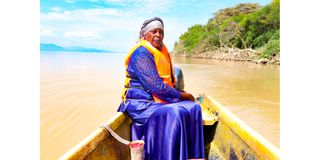Against the tide: Mother of 7 earns a living fishing and boating

Sarah Lenayapa, 46, on her boat in the crocodile-infested Lake Baringo. She opted to work in a male-dominated field to support her family.
What you need to know:
- Sarah Lenayapa, 46, was ridiculed when she joined the male-dominated fields; she ignored the backlash.
- Today she makes a profit of Sh700 daily from her fish business alone, and has achieved financial independence.
- She is undeterred, despite the threat posed by the presence of crocodiles and hippos in the lake.
Sarah Lenayapa, 46, rows her boat in the crocodile-infested Lake Baringo, ferrying people from the mainland to Kokwo Island, dozens of kilometres away.
This has been her workplace for the past two decades. The mother of seven ekes out a living from a venture dominated by men, despite the dangers associated with it. She is, however, undeterred, as this is what sustains her family.
Ms Lenayapa, from the Ilchamus community, also fishes, and sells the catch. She shares that she was ridiculed when she started fishing and boating, as residents claimed both were not meant for women. “Despite the backlash, I had no choice,” she says.
“I just resorted to working with men in fishing and ferrying people because I had mouths to feed. Here I am, at least I cannot beg for food and other necessities. I can provide for my family.”
Journey
She learned the trade after completing her secondary school education in 1997. She could not continue with her education because of lack of school fees. She recalls starting with a canoe, locally known as kaldich.
“It is tiny and cannot withstand strong tides. It is also dangerous, considering that the lake is infested with crocodiles and hippos,” she tells Nation.Africa.
After a few years, she got a boat and her business began to thrive. She leaves early in the morning to go fishing and then ferries people as she trades her catch.
“I had challenges when I started as I was not used to it. This is what feeds my family and helps me get other necessities, including school fees for my children.”
Her daily routine starts at 6am when she goes to neighbouring Kiserian village, some kilometres away from Kokwa Island, where she lives.
“I have to wake up early enough to fish in Kiserian because that is the area with enough fish. After getting a good catch, I look for some passengers to ferry from the island on my way to the mainland to trade the fish. That way, I can get money for fuel, and save the profits from the fish trade.”
From the fish business, she gets a profit of Sh700 daily, she says. She leaves the mainland by 2pm to avoid the strong tides on her way back to Kokwa Island.
“The tides, especially during the rainy season, start as early as 3pm. So I have to sell the fish and leave the mainland at 2pm,” she states.
“This work has myriad challenges because you have to observe the tides and know how to control the boat to avoid capsizing. Sometimes the fuel can get depleted before you complete your journey. It is not a walk in the park.”
She says crocodiles sometimes destroy her fishing nets and consume all the catch.
For her, the rise in lake waters has been a blessing in disguise as she reaps big transporting schoolchildren marooned by floods to Kokwa Primary School.
Apiculture
She has also joined a women's group whose members practise beekeeping with support from the Emergency Locust Response Programme.
Her children have also learnt to fish and row boats. They sometimes help her, she says. “I thank God the business has helped me a lot to provide for my family. I have also benefitted from the women's group. We have more than 16 modern beehives.”
She urges women to get up and do something to earn a living rather than rely on men for survival.
“My encouragement to women in the villages is to stop being a housewife. Get up and do something to support your family. A woman's place is not just in the kitchen," says Ms Lenayapa.





